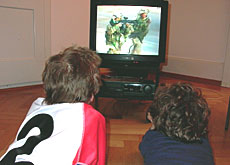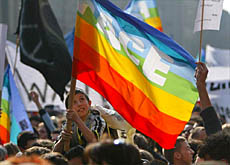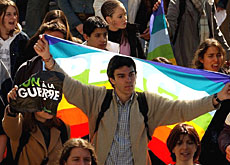War encroaches on children’s lives

Swiss youngsters have voiced their opposition to the latest Gulf war in street protests all over the country.
But the effects of the conflict have truly hit home as the media broadcast images of death and destruction from the front line.
“When will they be here?” five-year-old Michelle, from Kirchberg in canton Bern, has seen the pictures of falling bombs and tanks rolling through Iraq on television.
Yet despite knowing the war is far from home, she’s still afraid of the fighting.
Twelve-year-old Sergei, and his young neighbour, Ruben, on other hand, have no fear. They believe it was wrong for President Bush to get involved.
They both agree that the Iraqi leader, Saddam Hussein, must go, but not through the use of force and war.
Reputation
Sergei reckons Bush is harming the United States’ good reputation. “They would be better off putting money into schools, that way people wouldn’t support the war,” he told swissinfo.
Both boys have spent hours in front of the television since the beginning of the war.
Ruben admits he was shocked by the conflict.
“The real reason behind all of this is oil,” he said. “I’m also appalled that civilians are being killed.”
Heinrich Nufer, head of the Marie Meierhofer Children’s Institute in Zurich, believes the ongoing media show is a source of panic for many children.
“Children can’t forget these images, so they need outside support,” he said. “If youngsters can’t talk about it, they start to imagine things.”
Aimless
Most specialists agree that young children watch television aimlessly and without outside control. According to a pamphlet issued by the Bern cantonal education department, “Images of war can tax children’s imagination excessively and awaken fears”.
“We talked about the war at school a lot before it began,” said Sergei. Ruben adds that the conflict was also discussed in his class.
“We wanted to talk about the war, and our teacher tried to answer our questions,” he told swissinfo.
Gudrun Glas, a primary school teacher in Bern, hasn’t had to talk about the war with her first and second-year pupils so far, since they haven’t asked.
Aggressive
She hasn’t noticed any change in their behaviour either, adding that they haven’t become more aggressive or quieter.
“They’re too small,” she said. “I think they are protected by their parents and don’t listen to or watch the news”
She is prepared to field any questions the children might raise though, and will not try to avoid any talk about the war.
The Bern cantonal authorities have called on parents and teachers to discuss the conflict, but also to talk about peace.
Educators in the French-speaking cantons of Geneva and Vaud have been asked to talk about events in the Gulf region, and to stay as objective as possible.
Psychological
The federal government’s national network for emergency psychological help has also issued recommendations on how to deal with nightmarish media reports and do away with children’s fears.
Sergei’s mother, Barbara Breitenstein, wonders what and how much children can handle.
“What is reasonable?” she said. “Can children understand that this is deadly serious and not fiction?”
For children of the computer age, realising the difference between fiction and reality is not so simple, according to specialists. They point out that images of war are not unlike those seen in action films and video games.
Heinrich Nufer says that strategic games represent a particular problem. “The identification with the heroes and the actors in the game leaves a mark on the subconscious part of the mind,” he told swissinfo.
Playing war
Playing war outside with friends is less of a problem for Nufer. “It’s normal behaviour for children,” he said.
Vera and Anna, fourth-year primary students, organised an anti-war party for their class without adult help. The high point was a treasure hunt when the children had to find pictures of President Bush, which were then ripped up.
“We wanted to prove a point with this party,” said Vera. “We wanted to show that we didn’t agree with this war.”
“I’m not afraid, though,” she added.
Waning interest
The war has been underway for two weeks now, and the number of media reports has begun to drop off as interest begins to wane.
Ruben is watching less television than at the beginning of the conflict, as his interest drops off.
“There’s less entertainment value,” he said. “It isn’t as crazy as it was in the beginning.”
Sergei agrees with his neighbour, adding his viewing time has also subsided.
“There’s too much of it on television, and it’s getting on my nerves,” he told swissinfo. “There’s always a war somewhere.”
swissinfo, Gaby Ochsenbein (translation: Scott Capper)
According to specialists, children shouldn’t be left alone to watch images of war on television.
Adults should talk to children about the war in a frank and open way.
Avoiding any discussion will simply allow children to imagine anything they want.
Children could then develop unwarranted fears of war.

In compliance with the JTI standards
More: SWI swissinfo.ch certified by the Journalism Trust Initiative




You can find an overview of ongoing debates with our journalists here. Please join us!
If you want to start a conversation about a topic raised in this article or want to report factual errors, email us at english@swissinfo.ch.